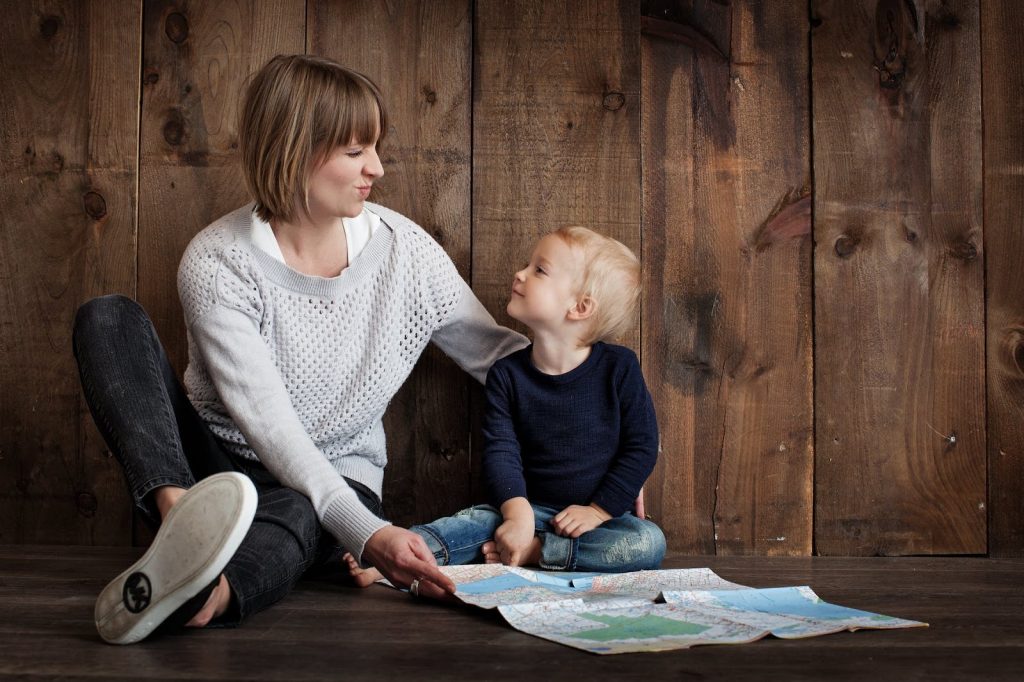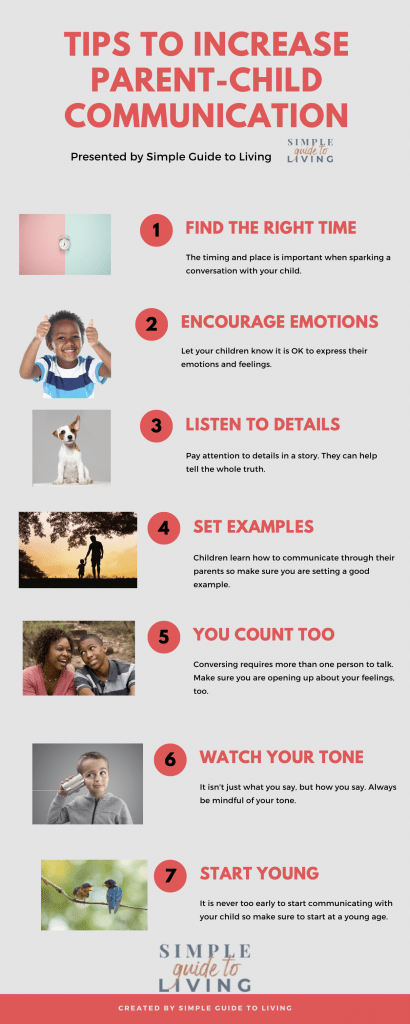Being a parent can be hard especially when children reach their teenage years. It also has been difficult recently due to the pandemic and the need for online schooling. During these times, parent-child communication is critical. It can be very beneficial for both parents and children to have a healthy and positive relationship through communication.
7 Powerful Tips for Great Parent-Child Communication
Families are stuck at home more than usual. The pandemic has really thrown all of us a curveball, especially with the expectation of having school online at home. All of these things can have their ups and downs, specifically when it comes to the relationship with your child.
Have you been struggling to communicate with your child? We have 7 parent-child communication tips to help you spark a conversation with your child and create a strong relationship.
1. Find the Right Time to Talk
There is always a right time and a right place to talk. Certain situations create a safe space for a conversation with your child.
While baking, cooking, driving, or during bath time for your younger ones, all of these situations will allow for a more at eased conversation. In comfortable settings, children are more likely to converse and open back up.
Keep in mind that these conversations don’t have to be serious all the time. Any communication between you and your child is positive. You can even ask questions casually to help eliminate the anxiety of having those tough conversations.

2. Encourage Emotions
We all know that growing up can be tough. It helps children to know that there is nothing wrong with feeling or showing their emotions.
Some children feel like they need to hide their emotions, but by asking questions, you can help them identify their emotions and feelings to help find the right words to express themselves.
This is best to start at a young age. Start by helping your kids tell a story from beginning to end. Ask questions, help them elaborate, and solve problems together
Children will communicate better with you when you let them know that you understand how difficult it is growing up.
Encourage your child to open up to you about their emotions and feel confident in coming to you to talk about the good and the bad in their life. With a parent’s guidance, a child should feel like they can overcome anything.
3. Pay Attention to Details
It can be hard to get your child to tell you the full truth of a story. Kids seem to skip over major parts either because they simply forgot or they are hiding something.
Parents can get more out of their children by asking specific details to a story.
We came across a great example to explain this better:
Your child mentions they lose their quarters under the vending machine that day. You might think it is odd your child was at the vending machine when you packed them lunch.
Instead of pressing the issue, ask a simple detail to get your child to open about the situation. A simple question such as, “what year were the quarters?” might spark your child into feeling more inclined to open.
Might find out that they were actually afraid to go to lunch because they were afraid no one would talk to them, which is why they were at the vending machine in the first place. Asking about details helps them dig deeper into their feelings and fears and helps you get to the root of it.

4. Set an Example
Children will learn to communicate through what they learn from their parents. This means you must set a proper example at all times. Not only how you communicate with your children, but also other adults.
Remember, children are very intuitive and pick up on a lot more than we think. You should always beware of how you are communicating as you might be being watched by your children.
This is also a great time to get advice. Ask your children for their input on how to make things better.
Remember, it isn’t always about you. Ask your child what changes you can make to help your children communicate with you better.
5. Don’t Forget it is a Two-Way Street
It takes two to tango and it also takes to build strong communication between a child and parent.
Yes, you need to talk with your child about their feelings and emotions. But don’t always converse just about them and their feelings. It is also about you.
Keep in mind that you never want to complain or nag constantly about your bad day, but feel free to be open to your child too about your feelings. This is how they learn as well. Seeing their parent feel and communicate about their emotions will teach them to do the same.
When communicating with your child, share similar stories and experiences. You don’t always have to ask questions, you can also share your thoughts!
6. Be Mindful of Your Tone
It isn’t just what you say, but how you say it.
Your tone and the emotion you show are so apparent to children. This means you need to be aware of your tone whenever you are communicating with your child.
If you are in a bad mood or angry, it might be best to avoid discussions. You never want to take out your frustrations on your children and you can easily do this simply by the tone of voice you use.
When you do need to talk with your child and you are feeling upset, it is best to take the time to calm down, then talk.
7. Start When They are Young
The best way to ensure you are laying a solid foundation for communicating with your child is to start when they are young.
Openly talk with your younger children and ask questions about what they are feeling. This is how children are going to learn to communicate their feelings and also learn to communicate openly to you.
As we mentioned before, a good time to talk with younger children is during bath time or while in the car. You can increase the intensity of your conversations as your child ages and evolves.

The Beauty of Parent-Child Communication
A healthy relationship with your child starts with the way you communicate with them.
When you establish a healthy and strong relationship with your child at a young age and as they grow, the relationship is more likely to continue well into adulthood.
And let’s be honest, every child needs their parent…no matter what age they are!
Resources
https://time.com/65324/7-powerful-tips-for-great-parent-child-communication/


